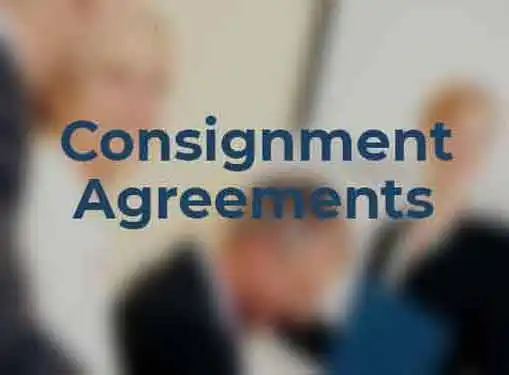Legal Information for Entrepreneurs
Consignment Agreement
Consignment is a great way to market your products without incurring the cost and headaches of a retail operation. A consign agreement protects your interests - but you'll need to know what to include to avoid losing your products and your good nature.
Consignment is becoming more and more popular in today's business environment.

Everyone from niche product manufacturers to retired people looking for extra cash are turning to consignment as a way to outsource retail tasks and limit overhead requirements.
From the outset, it's important to understand that consignment isn't a sale. The retailer is not buying a product and is not obliged to pay for they product if they aren't able to move it off their shelves. Consignment is essentially a service - one business (or individual) is paying someone else for the service of selling merchandise.
Consignment arrangements are legally and functionally bound by terms that are described in the consignment agreements. These agreements protect both the retailer and the merchandise owner, and should include several important elements.
- Company obligations. The retailer's primary responsibilities (pricing, display & insurance) should be defined at the start of the consignment agreement. Retailers usually have the freedom to price the merchandise themselves, provided they try to obtain the highest possible price and the price doesn't fall below a minimum price described in the agreement. The agreement should also hold the retailer responsible for maintaining insurance against theft or damage.
- Payment terms. The agreement specifies the percentage of the sale the retailer will retain for his services. The balance of the sales price (price minus retailer's percentage) will be forwarded to merchandise owner within a certain time period (e.g. ten days) of the completion of the sale.
- Consignment term. Consignment is not a perpetual business arrangement. A good consignment agreement identifies the length of the consignment period and provides a way for the merchandise owner to pick up their merchandise before the period expires. It's typical for merchandise owners to retain the ability to retrieve their merchandise at any time, as long as they give the retailer three days advance notice.
- Merchandise owner obligations. Merchandise owners also have responsibilities in the relationship. Consignment agreements should address responsibilities like the delivery of goods and the retrieval of unsold merchandise. If the owner fails to pick up unsold merchandise after the expiration of the consignment term, the agreement can specify that ownership transfers to the retailer.
Share this article
Additional Resources for Entrepreneurs


Conversation Board
We greatly appreciate any advice you can provide on this topic. Please contribute your insights on this topic so others can benefit.